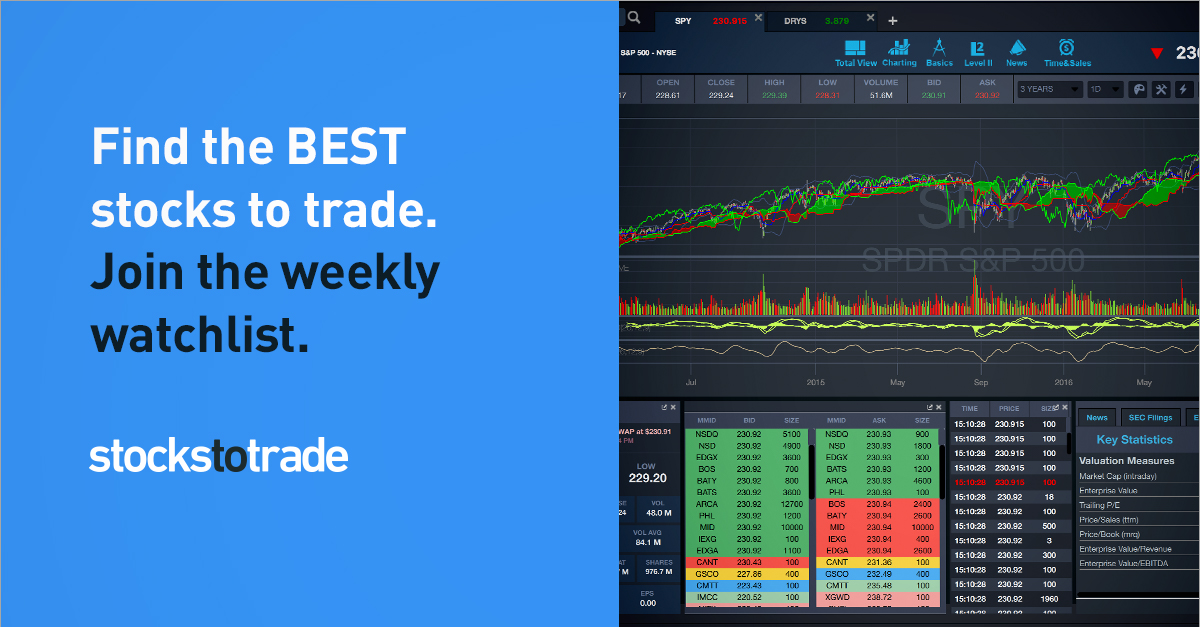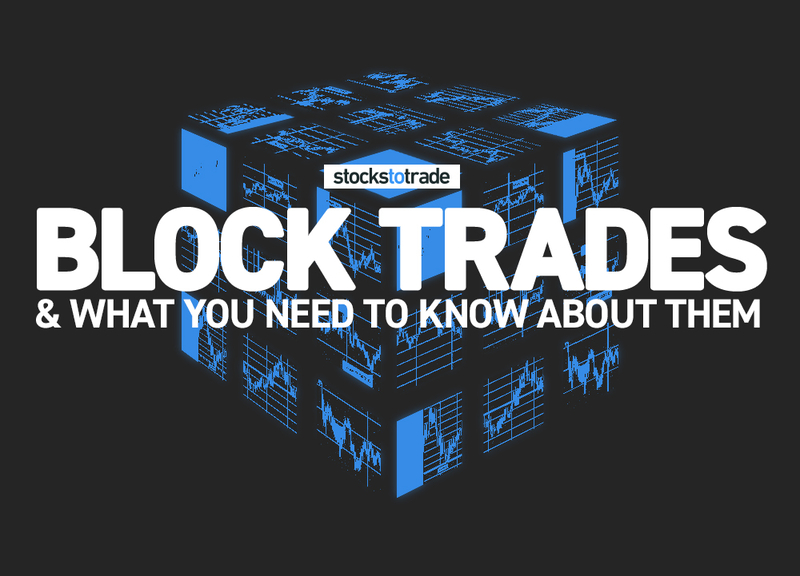What are block trades — and why would day traders need to know about them?
No, block trades aren’t tickers that your broker bans. They aren’t even regular retail trades. Rather, they’re large trades made outside the regular exchanges.
Block trades are trades with massive share counts.
- But how do they work?
- How can you place block trades?
- And why should you know about them?
Read on to find out more about block trades and how they’re used.
Table of Contents
What Is a Block Trade?
A block trade is a very large trade. These trades are typically 10,000 shares of a stock or more. It’s similar to how 100 shares are called a ‘lot.’ Depending on the exchange, a block trade is sometimes defined as a trade worth $200,000 or more in market value.
Because the trades are so large, they don’t go through the regular market. They’re traded through a contract between a buyer and a seller.
These days, block trades usually go through dark pools. But don’t worry — your shares won’t be soggy when you get them.
 How Do You Place a Block Trade?
How Do You Place a Block Trade?
Since block trades are such large trades, they aren’t done by regular traders. So who makes these massive trades? Usually, trading firms and institutional investors place block trades.
So you won’t be able to get in on the action. But there’s no need! Retail traders don’t get any benefit from trading outside of the market.
Why are we talking about this at all, then? There are ways to view block trades. And you can use this info to inform your own investing and trading decisions.
As we said before, block traders usually trade through dark pools. As the name suggests, these are private exchanges with a lack of transparency. Dark pools allow block traders to match with other high-liquidity block traders without affecting the retail market.
By doing so, they can avoid massive price swings. Sometimes, even your broker routes retail orders through dark pools for better executions. But what benefits might institutional investors get by not trading through the market?
Why Do Traders Use Block Trades?
Block traders avoid public exchanges to prevent causing market volatility and reduce slippage. They also do it to reduce commission fees and outside scrutiny.
(Need help understanding how to trade in a volatile market? Check out this two-hour, no-cost video: “The Volatility Survival Guide.” Tim Sykes made this guide … And I make an appearance too. I also include tips on how to get most out of StocksToTrade!)
 Reduce Market Impact
Reduce Market Impact
When a block trader buys a stock on an exchange, the first orders are filled at market price. But consecutive orders start to push the stock price higher. Their large size affects the market price drastically. This is simple supply and demand…
The block trader creates more demand and pushes up the price.
That creates unnecessary volatility. One trader can push the price up simply because they have a very large position. Not only is this unfair to market valuation, but this also affects the trader as well.
That’s why block traders use private exchanges like dark pools. Block trade buyers can trade with block trade sellers. There, the price is settled at VWAP, other times, it’s between the bid and ask. Trades on private exchanges don’t affect the public market price.
Price Improvement
Let’s suppose a block trader places a buy market order on an exchange. The buy order starts to fill at $9 … but soon shifts to fill at higher and higher prices. So they get filled at $9.10, $9.20, and so on…
By the time they’ve filled their entire position, their last orders might have filled at $10! What started out as a market order at $9 filled at a $9.50 average cost. (This is only an example, you should never place market orders. Remember, limit orders are safer!)
In the end, the block trader is left with a bad average price due to slippage. This is another reason block traders avoid using a public exchange. They have no control over their execution price there. Outside of public exchanges, a buyer and seller can make a deal for a predetermined price that satisfies both parties.
Commission Fees
Most traders know how commission fees can eat into trading profits. It’s one reason why some brokerages are moving to a zero-commission model.
Now, imagine fees on orders of block-trade magnitude. They could be staggering! By placing block trades outside the public market, traders can substantially reduce their fees. They can potentially get much better prices than those brokers and exchanges normally charge.
Discretion
A block trade in regular market hours may attract unwanted attention. This is because others can see the huge order on Level 2 quotes. Other traders may front-run the block trade by placing their orders slightly above it…
Block traders want to avoid this. They need as much discretion as possible.
By completing block trades through dark pools, traders can anonymously place orders without other traders seeing them.
A dark pool automatically matches trades without showing any orders to traders. Their trades may become apparent after the fact on the consolidated tape. (This is the Time & Sales tracker to the right of the Level 2 quotes on the StocksToTrade platform.)
StocksToTrade allows traders to screen for hot stocks with cutting-edge customizable screeners. It features an intuitive interface and elegant charts designed by dedicated traders. And there are multiple tools you can add on for your trading needs.
There’s TipRanks access for insight from top analysts and listing of insider trades. And there’s the Oracle Daily Direction Alerts that can help you hone in on the highest-potential movers.
It’s no wonder some of the best traders prefer StocksToTrade every trading day. Find out what you’re missing — try StockToTrade with a 14-day trial for just $7!
Block Trade Disadvantages
There are some perks to block trades … And there are some flaws with it. High-frequency traders (HFTs) use latency arbitrage and faster access to dark pools to their advantage.
Block trades have also been criticized for not taking place on the public market. That can give block traders an unfair advantage over retail traders. Let’s take a closer look…
High-Frequency Traders
HFTs have been able to exploit block traders in the dark pool. Like bats, they ping around to get a better picture in the dark. HFTs use their fast trading algorithms to feel out the hidden orders in the dark pool.
And by executing smaller trades, they can front-run big investors. They can then place their orders before the large block trades to gain an advantage.
Lack of Transparency
The way block trades are handled is concerning to some traders and investors. Trades placed outside the public market raise concerns of a double standard when it comes to capital markets. Some believe that dark pools are less scrutinized and anonymous. This can lead to potential fraud and illegal trading practices by the associates of the dark pools.
Why Are Block Trades Important?
Nevertheless, block trades are an important avenue for institutional investors and trading firms. They’re an easy way to access large liquidity. Pension funds, hedge funds, and banks use them to make big trades without impacting the market with every trade.
Some traders keep an eye on block trades to find a potential edge…
Scanning for Block Trades
Some retail traders like to scan for block trades. That’s because these trades are made by smart money — like institutional investors and hedge funds. These firms can hire hundreds of fundamental and technical analysts to predict price movements. So when these firms make a trade, it’s likely backed by strong conviction and reasoning.
Block Trade Indicators
You can’t see current block trades on Level 2. Most of the time, they come up after the fact on the tape. This is the Time & Sales tracker that scrolls down as trades are executed.
There are some brokers that let you filter through this tracker for block trades. You can simply filter for any trades over 10,000 shares, excluding any penny stocks. A block trade of a penny stock usually has a relatively cheap market value — so block traders tend to stay away.
When you see block trades go through — specifically those that are over 10,000 shares — you can probably assume it’s a sign of interest in a company. This could especially be useful if these trades are on small to medium market cap stocks. Since these stocks are much smaller than the blue-chips, an influx of smart money could signal notable price growth in the near future.
StocksToTrade
StocksToTrade is a trading and scanning platform designed for traders by traders. It comes loaded with 40+ built-in scans, awesome charting capabilities, news feeds, and so much more.
We work constantly to improve and upgrade our platform. We even have a tool that can help you spot the stocks blowing up on social media.
Our latest feature is the Breaking News chat room. The market is so volatile right now, and there’s so much movement … So how can you find the best trading opportunities? Use the best tools. The Breaking News chat will alert you to the news that matters. It can help you filter out the noise.
The Bottom Line on Block Trades
While you can’t place block trades as a day trader, they’re an important part of the trading ecosystem. Some traders like to scan for block trades to gain a statistical edge or to see what the ‘smart money’ is up to.
Although it’s important to know about block trades, we like to focus on lower-priced stocks here at StocksToTrade Pro. Join our mentorship program to learn what’s happening in the market. I give webinars twice daily every trading day. I tell you my take on what I see before every market open and close.
 Education is critical to becoming a consistent, smart trader. You gotta constantly work to learn, refine, and improve.
Education is critical to becoming a consistent, smart trader. You gotta constantly work to learn, refine, and improve.
That’s why at StocksToTrade Pro, we focus on how we can be better traders every single day. We want you to become a knowledgeable and informed trader, too…
Wanna see how I trade every day? Join me and an amazing group of traders at StocksToTrade Pro now!
Also, keep tabs on the StocksToTrade blog and SteadyTrade podcast. We cover what’s going on in the market, day trading essentials, key scanning tips, and much more.
Block trades are a crucial part of the market to allow institutional investors to trade without significantly impacting the market. Smart retail traders can keep an eye on them to understand what can move stocks. That’s what it’s all about.
What do you think? Do you scan for block trades? Leave a comment below and tell us why or why not!
